Future Frequencies Salon All Female Panel on A.I. Transcript
An inspiring cohort of women and ally leaders working in and around A.I. gathered for a three-day event of learning, connecting, and uplifting one another at Aurora21, AI Design Corps’ high-tech headquarters in the tranquil Hudson Valley. Partnering with Vibes AI and 3% Creative Coaching, the three-day event of the Future Frequencies Salon series shared human-centered generative A.I. skills like prompt engineering along with dynamic talks, workshops, live vibrational therapies, and career coaching.
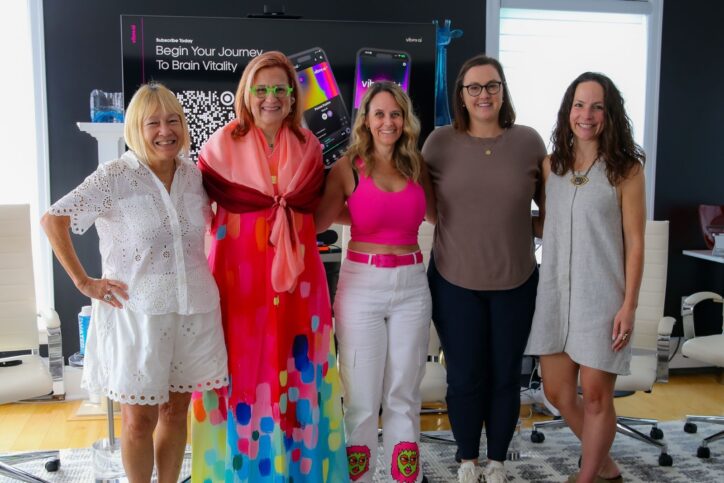
Helen moderated the “Algorithm Architects Panel: Women Leading the A.I. Revolution,” featuring a stage full of women leader in A.I. discussing the importance of self-empowerment, community, and supporting DEIA efforts in A.I. development.
Meet the speakers below and keep reading for a full transcript of the panel discussion.
The Speakers:
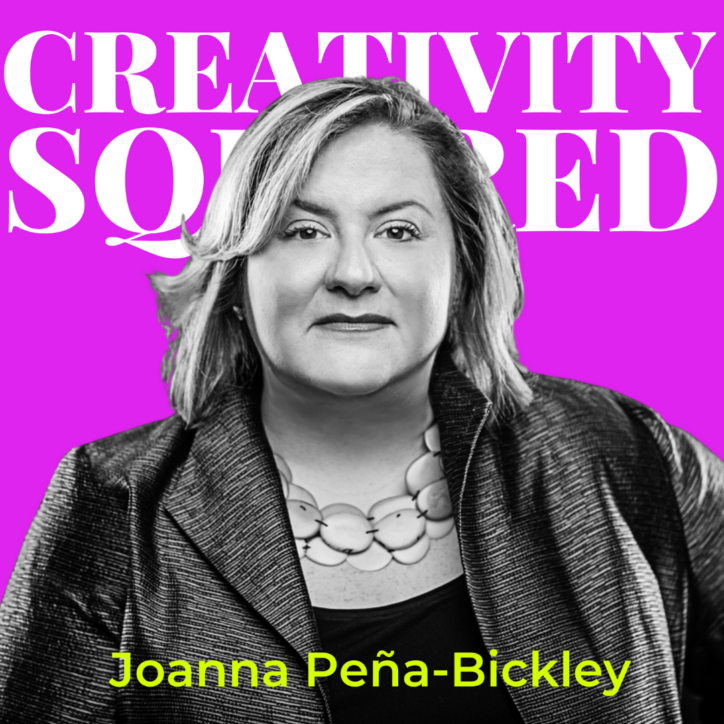
Joanna Peña-Bickley, guest in Creativity Squared Episode 4, is an inventor and a design technologist, is known as the mother of Cognitive Experience Design and a pioneer in A.I. aided generative design. She is propelled by multidisciplinary acumen in research, design, technology and media. Her dedication to lifelong learning and insatiable curiosity moves CEOs beyond obvious ideas, towards enduring, market making experiences, platforms and devices for the connected era.
Joanna’s award-winning hand has galvanized earth’s most recognized companies and brands, such as IBM, L’Oréal, Sephora, American Express, NASA, MTV, Pepsi and Jay Z, to imagine and launch transformative inventions, products and services with a philosophy of radical collaboration and remarkable craft. Whether creating one of the first streaming video players that changed the delivery of live news for ABC, designing the first banking app on the Apple Watch for Citibank, designing the first smart mobility platform for General Motors, inventing new ambient intelligent Alexa Devices for Amazon, or reimagining the world’s mobility for Uber, Joanna’s customer obsession and tenacious creativity delivers business results.
Named one of Fortune’s Most Powerful Women, a 2022 Hispanic Star and a Power Woman of New York, her visionary, executive leadership is fueled by a mission to design inventions that work for everyone, everywhere, everyday. Joanna stands as a dynamic voice, organizer and advocate for women and girls in the fields of design and tech. Her passionate advocacy has accelerated the inclusion of women on US currency, and advanced the S.T.E.A.M.D. education movement and progressed refugee resettlement, digital literacy and workforce up-skilling making her a sought after keynote speaker at conferences such as Fortune’s Brainstorm Design, CES, Cannes Lions, World Economic Forum, SxSW, TriBeCa Film Festival, and C2 Montreal.
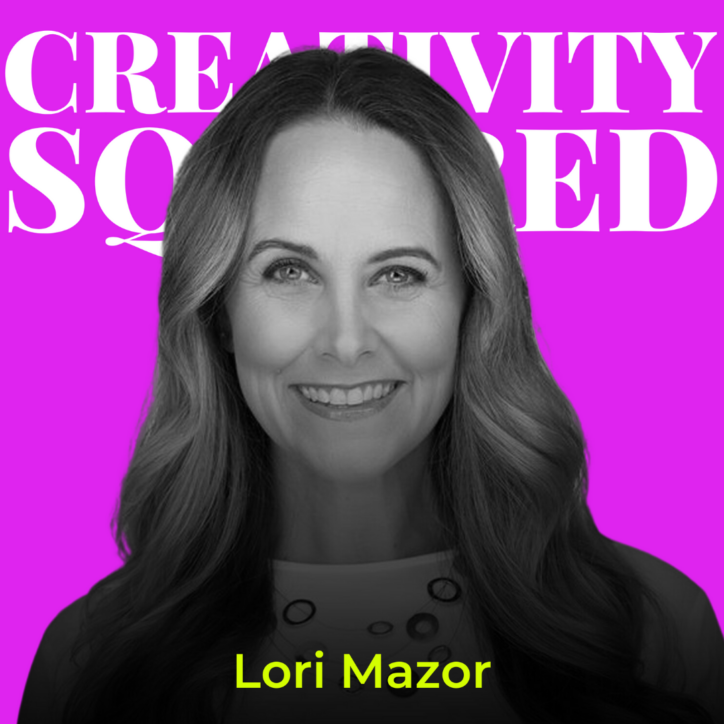
Lori Mazor is a visionary leader at the intersection of artificial intelligence and creativity. Her recent book, Temperature, explores themes in creativity during the age of artificial intelligence.
As the CEO and Founder of Synthetivity, Lori teaches executive leaders about the transformative power of Generative artificial intelligence. With her unique background in architecture and a passion for pushing the boundaries of technology, Lori has already educated over 3,000 leaders. At the bleeding edge of GenAI, her work extends to prestigious institutions like Cornell Tech, Fordham University, New York Tech, NYU, and Tufts. A distinguished architect, strategist, and celebrated multimedia artist, Lori has won industry awards and her creative work has been featured in major publications.
On Creativity Squared Episode 52, Lori dove deeper into her book, “TEMPERATURE: Creativity in the Age of AI,” challenging our traditional notions about creativity and sharing how A.I. can enhance our creativity.
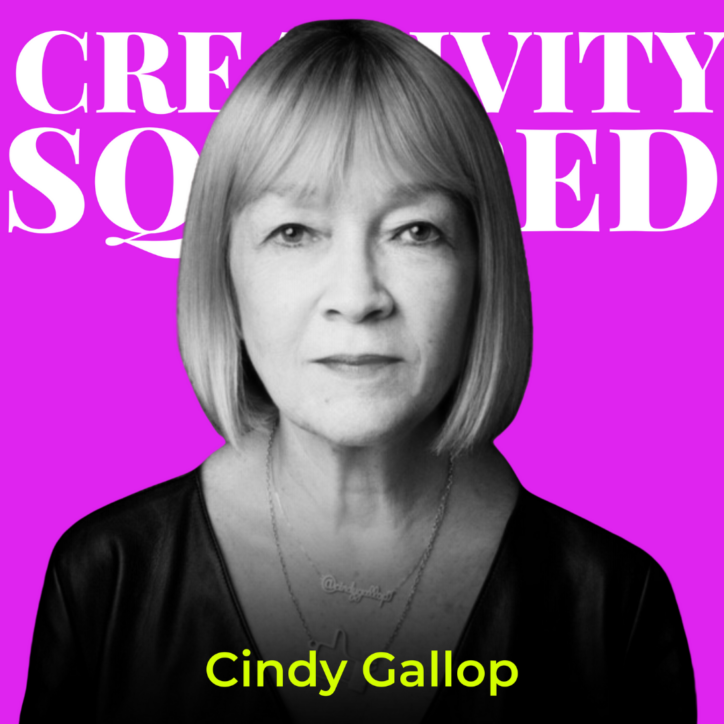
Cindy Gallop, named “The Most Provocative Woman in the World,” is the Founder & CEO of MakeLoveNotPorn, the world’s first and only user-generated, human-curated social sex video-sharing platform. She’s the face of ‘the Social Sex Revolution’ with the mission to end rape culture by socializing and normalizing sex and promoting good sexual values and behavior.
With over 30 years in the advertising industry, Cindy is an outspoken advocate of diversity and inclusion in advertising, tech, and business. She consults with brands on radical, breakthrough, innovative, and transformative ways to change the game in their industries.
Cindy was a guest on Creativity Squared Ep.35, where she discussed the connection between lack of funding for female founders and the rise of nonconsensual deepfakes. She also joined Ep.43, where she emphasized the importance of the female perspective in tech development and discussed her latest project in development, the MakeLoveNotPorn Academy for lifelong sex education.
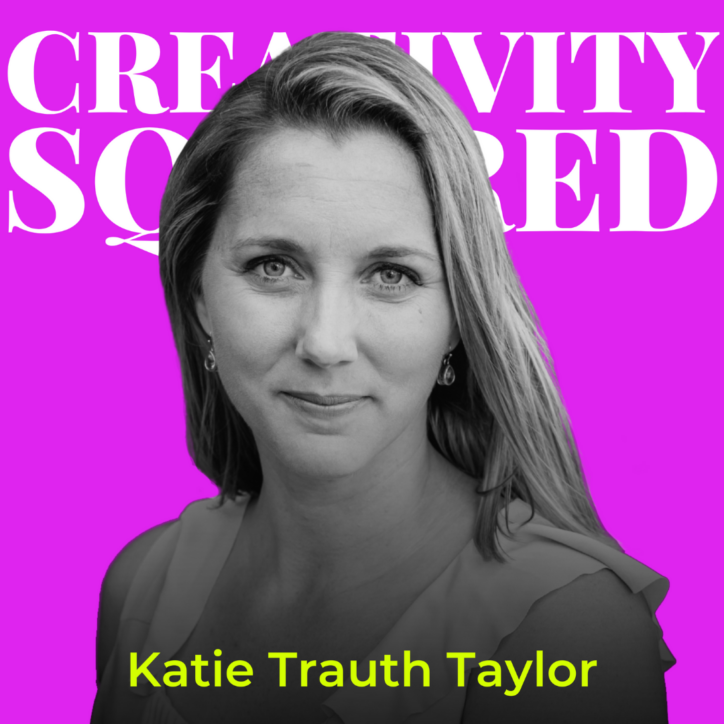
Kara Uchtman is a dynamic leader in technology and product development, currently serving as the Chief Product Officer and Co-Founder of Narratize. With a background in chemical engineering and a professional engineering license, Kara has a rich history in both startup environments and large corporations. She has held significant roles at companies such as SonderMind, Qntfy, and Eccrine Systems, where she has been instrumental in delivering complex technologies and leading strategic initiatives.
Kara’s work spans a variety of sectors, including biotechnology and consumer products, with previous experience at Procter & Gamble and Cytec Industries. Known for her values-based leadership, she focuses on aligning organizational goals with individual strengths and interests, fostering a collaborative and data-driven work culture.
On Creativity Squared Ep.36, Narrative CEO Katie Trauth Taylor spoke about her company’s mission to leverage A.I. for better storytelling, and the importance of equitable representation in the A.I. industry.
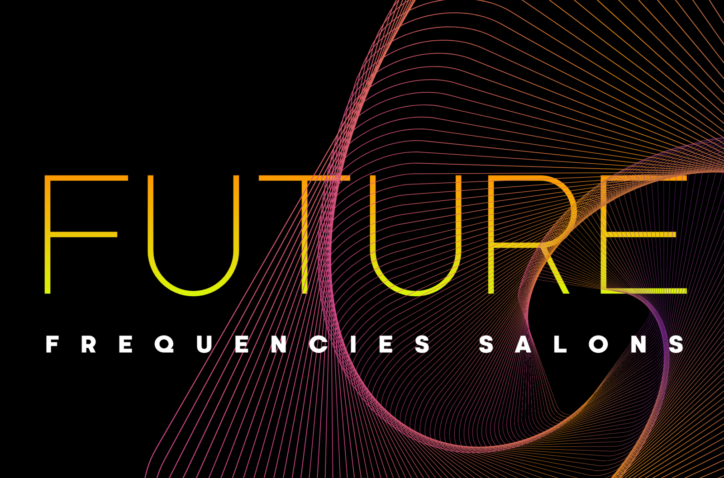
Transcript
This transcript has been lightly edited for clarity and conciseness.
Helen Todd: It’s so good to be here. I’ll be here all day and tomorrow, so we’ll get a chance to hopefully meet each of you. But to kick it off, because we’re on a tight schedule today, I’ll do a quick introduction. I’m Helen Todd. I’m the founder and host of Creativity Squared, which is a podcast that explores the intersection of A.I. and creativity. Everyone on the panel, and Kara’s co-founder, has been a guest on my show. So it’s a great honor to have everyone up here.
I’m going to start off with a quote from another guest, Sam Jordan, who was on episode 50. It’s kind of been one of my calls to action: “The pessimistic scenario happens when you maintain the status quo as technology advances and as behaviors change. You will get a pessimistic scenario 10 times out of 10 if you change nothing. Optimism is harder because optimism requires you to do something.”
I know everyone on this panel is optimistic and are A.I. leaders, women A.I. leaders, taking action to change the world that we’re living in, that we’re co-authoring and co-creating together. So I love that quote, and I love that we get to talk about this subject.
Very quickly, we’ll have each of you introduce yourself elevator pitch style – who you are, your company what you do, and maybe your first introduction to your A.I. journey.
Kara Uchtman: Kara Uchtman. I got to meet so many of you yesterday during my presentation on Narratize, where I’m Chief Product Officer. I apologize, there’s one flight to Cincinnati out of New York, so I will be leaving right after this panel. But if you want to connect with me, I’d love to follow up with everyone. I’m so disappointed that my time here was so short this weekend.
My A.I. journey – I was thinking about this, and I feel like I would say recently because of my time with Narratize. When I look back on my career, really there was modeling and simulation and all of these other things that weren’t generative A.I., what I’m doing now, but really were those stepping stones to today.
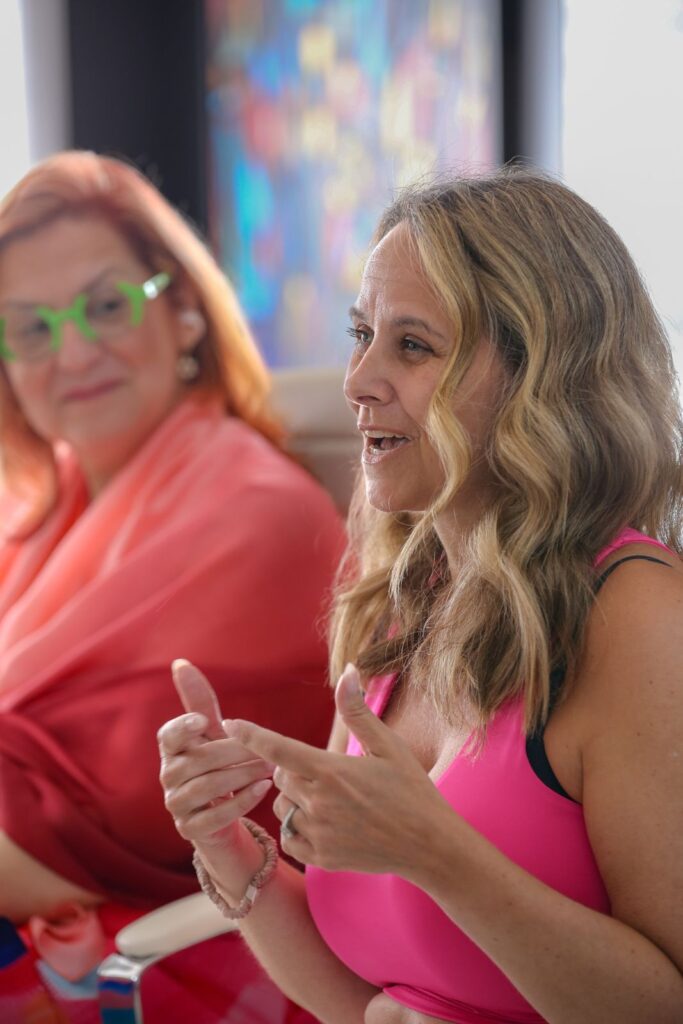
Lori Mazor: I’m Lori Mazor. I am the CEO and founder of Synthetivity, that is a portmanteau of synthesis and creativity. It’s a bit of a tongue twister, intentionally. I teach A.I. with a human touch, and I tripped into artificial intleligence. I was trained as an architect. I took a sabbatical after being burnt out after the pandemic, as I’m sure many people in this room can relate to.
I enrolled in a class at Wharton called “The Business Economy of the Metaverse,” thinking that was going to be the new place I was going to put my future energy. I had a list of applications I wanted to try out, and Midjourney was at the top of them. As soon as I started making images, I went deep into the A.I. rabbit hole, and I haven’t come out.
Cindy Gallop: Hello, I’m Cindy Gallop. I’m the founder and CEO of MakeLoveNotPorn. We are pro-sex, pro-porn, pro-know the difference. My A.I. journey started about five years ago, directly as a result of our amazing hostess, Joanna, because we had a conversation five years ago that led me to an A.I. product for MakeLoveNotPorn, which is still in the pipeline, for reasons we’ll be talking about on this panel, I’m sure, but which I am determined to make happen. That really led me to go deep into A.I. and see the huge opportunities for the future of A.I. through the female lens, which we are totally going to get into.
Helen Todd: To kick things off before we dive into the A.I. thing, because we’re all founders and entrepreneurs, and I think it’s super important to celebrate every win along the way, what’s one quick win that we can help you celebrate today?
Kara Uchtman: We showcased the Article Analyzer, our recent first part of our Research Hub on Narratize yesterday. That launched about a week ago.
Lori Mazor: I wrote a book. It’s called “Temperature: Creativity in the Age of AI“, and it’s the best thing I’ve ever done other than my daughter.
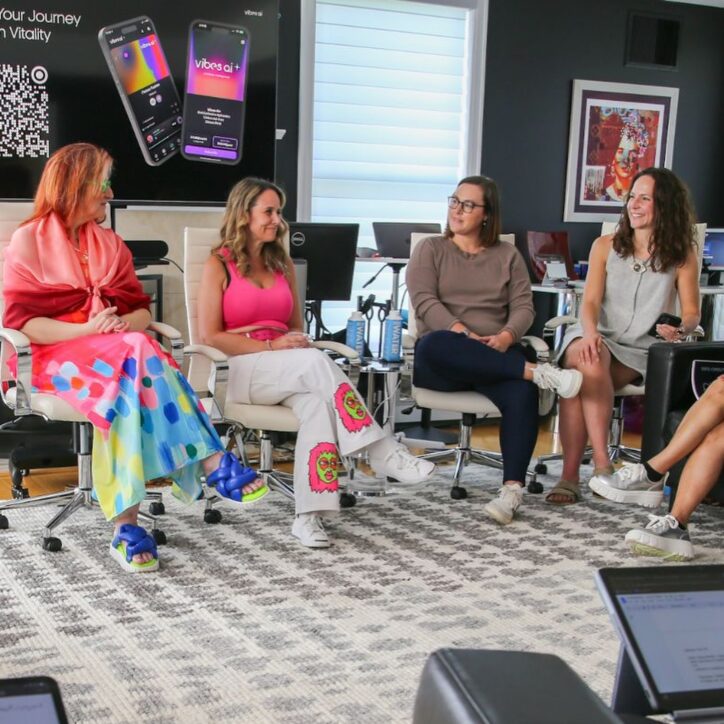
Joanna Peña-Bickley: Our win was we have reached, as you all got to demonstrate yesterday, our first version of our works-like prototype and began our subscription business as of yesterday.
Cindy Gallop: Thanks to an equity crowdfunding campaign running on WeFunder, we are finally able to build what parents and teachers have been begging me for since day one of MakeLoveNotPorn, which is the sex education expansion, MakeLoveNotPorn.Academy. You’ll see my vision made out of that URL. We are going to be releasing a bare bones MVP in a couple of months’ time, hopefully September, to coincide with back to school. That is where the world will have access to the only aggregator hub for the best of the world’s sex educational content, segmented by age appropriateness, all the way from zero to 18 through to adult, cradle to grave. So we’re excited.
“I would describe A.I. today in three words: white-bro-dominated. That is a huge, huge problem, because the single most damaging impact of A.I. right now for women and girls is the explosion of deepfake porn.”
Cindy Gallop
Helen Todd: My podcast, Creativity Squared, not only explores the intersection of A.I. and creativity, it’s also about envisioning a better tomorrow. So I want to explore some of the questions I’m going to ask through that lens of, what does a better tomorrow look like, from all of the different seats that you sit in as women leaders in A.I., about our shared future. So first, it’s the end of July 2024 in this new age of A.I., how would you describe this moment in time of artificial intelligence? Where are we at right now?
Kara Uchtman: I think post-hype, now in the reality phase. This is cool, it’s hip. But now people are starting to figure out, okay, how do I really use this? How do I make a difference in my life, my organization, as opposed to just being like, “Oh my gosh, I’ve never seen anything like this before.”
Lori Mazor: My focus is on education, and primarily 75% of my clients are women, and the other 25% are men over 50. So getting those folks to tap into their full potential. It’s one of the things that I’ve found A.I. has given me, is the ability to be kind of an amateur in a lot of things and raise my bar. I really enjoy empowering others to do the same.
Joanna Peña-Bickley: For me, it’s twofold. The first one is really actually bringing women’s cognitive health to the forefront in ways that I don’t think we could do before this point. I think we’re brainiacs, but I think we face so much, and we still live in a world where there are barriers to age. As we are living longer – and we are living longer, I intend to live to 125 – I want to have a life of dignity. Part of that dignity, I think, is going to be enabled by technology.
On the other hat that I wear, which is the education piece of it, this moment is hopeful because I think we’re starting to move past the polarized conversation of “it’s the best thing since sliced bread” versus “it’s the worst thing since nuclear war.” That’s had a chilling effect on women, and it has kept them out of the space, and we need more women in this space. By the way, we talked about it yesterday, but there have been women in this space, so part of it also is acknowledging the women that have been working in this space, like my friends Rita. We’ve got a few folks here today. It’s about raising us up, but it’s also for the intent of there are lots of young women here today that are AI Design Corps members.
So for me, when I wear both hats, it is both around cognition. They both center on cognition. One is about how do we get more early childhood cognition, and then how do we solve longevity and continued learning in that cognition? I think we’re in a much more hopeful place today. And the last part is, I actually think that we now have the political conditions to be hopeful.
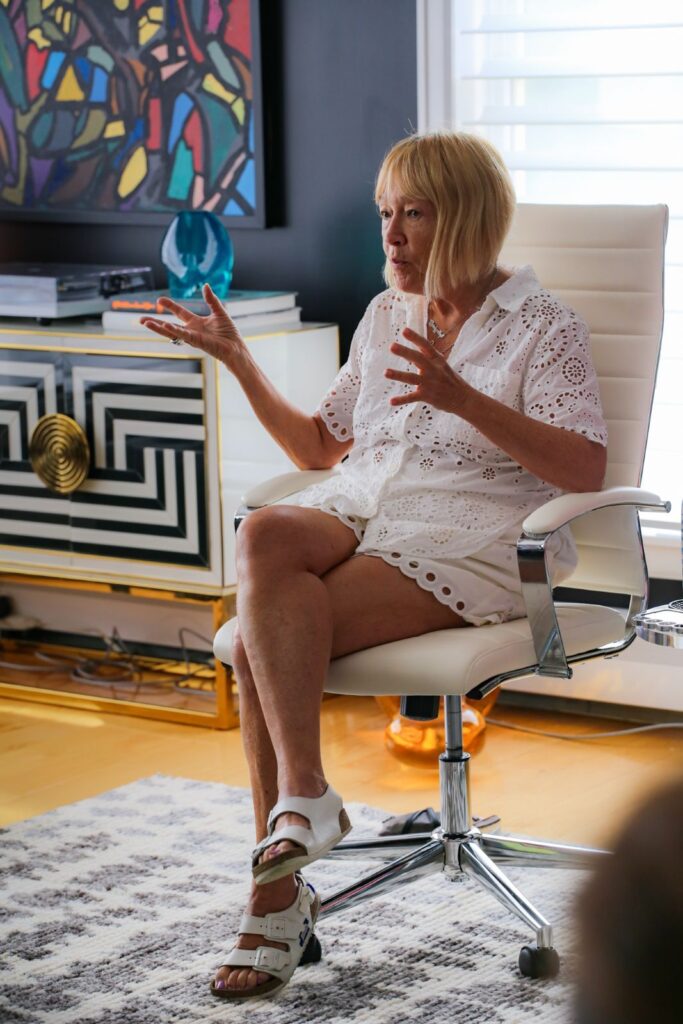
Cindy Gallop: I would describe A.I. today in three words: white-bro-dominated. That is a huge, huge problem, because the single most damaging impact of A.I. right now for women and girls is the explosion of deepfake porn. And by the way, I use that phrase because you need to know what I’m talking about. Just so you know there is a huge number of women who want the terminology to be different, because “deepfake porn” does not represent the criminal activity this action is. “Intimate image abuse” and “digital image forgery” are the terms that we’re looking to try and get much more widespread.
But basically that is a function of, to Joanna’s point, not having enough women in A.I. at the moment, and that, in turn, is a function of something I’m going to bore you all to death by repeating regularly on this panel, which is female A.I. founders are not getting funded. There’s a very simple answer to the explosion of deepfake porn: fund female A.I. founders. So that’s my view on the state of A.I. right now. We’re going to change it.
Helen Todd: Maybe on the flip side, what are you most excited about? And then we’ll dive more into how to fix the current state too. But I’ll kick it off to you, since it’s kind of the contrast to what you just said, Cindy.
Cindy Gallop: What I am most excited about is the completely different lens we bring to artificial intelligence. I wrote an op-ed for Fast Company last December, which I urge you all to read. It’s called “Three Reasons the Future of AI Relies on Women” and those reasons are very simple. First of all, we make A.I. safer, to my point earlier. The second one is that we build use cases the world embraces. This is important, because right now there’s a lot of talk about how A.I. is going to make money. We know how A.I. is going to make money, because we are 50% of the population, and we bring completely different use cases to the fore.
This is the A.I. version of historically young white male founders in Silicon Valley, as the saying goes, building startups to do what their mom no longer does for them, i.e. delivery. That is what we are seeing in white male A.I. right now, because that’s all that they can figure out. There are women doing manufacturing, agriculture. So we bring the use cases that help the world, and thirdly, what that means is we make A.I. make money. And so I’m very optimistic about what all of us and the many women beyond this room are going to make happen in A.I. and completely change the future of A.I. from what it’s being perceived as.
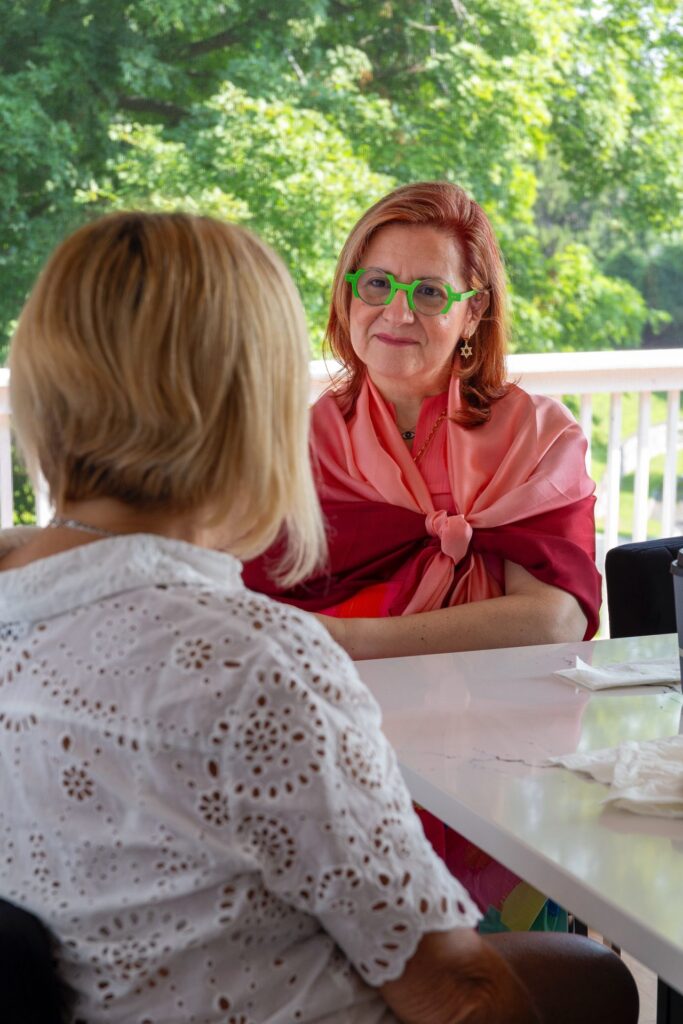
Joanna Peña-Bickley: Easy one, A.I. makes money. What I have found, and just more recently, been on VC rounds, is we’ve actually been one of the early-funded companies where we can show a profit in less than a three-year period. So when we talk about female founders and the importance of us, I think there was a significantly lower bar.
I actually have two products here, two A.I. computers, that I want to share with you that have spectacularly failed in their research. The Rabbit – this got $100 million in funding from a young male founder who thought it’d be really cool to try to put in a video game. This got 150 million. This is the A.I. Pin. You have to give kudos to – I wish the CEO was a little bit more upfront. She is a woman, but the reason they got funding was because her husband had to do all of the pitching on her behalf. This is a phenomenal product, by the way. She is former Apple. They are both former Apple. They left Apple to do this, but they have spectacularly failed because what they didn’t have is that when male founders actually go to get money, they’re not asked about their financials the way that we are.
How do your use cases actually translate into dollars? We’ve been able to get traction because we’ve been able to prove that. Now these two launches have tempered the investment community a little bit on what’s to come in artificial intelligence. There was a bit of cynicism that came over. All VCs were like, “Well, are you just another Rabbit? Are you just another one of these?” And what three of their investors told me was that they didn’t have a plan to make money. They got all the funding, and when they look to us, we have the plan. We actually have the use cases that make money. This is how we actually have to lead, money first.
One of the things I love about sitting on a stage with Cindy, being in a room with Cindy, is that maybe learn the money, go chase the money, because if you can prove the money story, you will get the funding. It’s going to be hard, but you will get the funding. I share a lot of optimism in that when you actually answer the money question first, the people are there with the money.
“I’m not necessarily attracted to A.I. because I think data science or data engineering is the most exciting thing. What I love is it’s a tool to help us solve problems that are really important.”
Kara Uchtman
Lori Mazor: I could talk ad nauseum about A.I. music, and I know that’s not something very many people talk about. I grew up as a singer and a kid in the theater, but when it came time for me to pick a career and go to college, my father said, “You need to have something that gives you health insurance.” He’s an engineer. My mother is a librarian. We have a lot of pragmatism in our family, and so I took a traditional career path. Architecture was the closest thing to engineering I could come up with. That led me into a very stable career. I moved into universities, I had a salary. I checked lots of boxes.
What excites me now about A.I. is I don’t have to check any of those boxes. I had a guy trolling on my social media this week and I just let the conversation go. Sometimes it’s good to just let people kind of show who they are. I put a male friend on him so I didn’t have to engage all day long. He said, “What are your qualifications to muse?” I say in my newsletter that I muse about A.I. and creativity. “What are your qualifications to muse about A.I. and creativity?” I sat there and thought, at what point do I say I got a degree from Yale in architecture? This soul is clearly troubled and needed to demonstrate disqualification, which he did in life.
My point is that at 40, I stopped checking boxes, and it was the most freeing thing. What does A.I. have to do with that? It’s that you can literally be a dilettante in anything and be an expert. This is a completely new world for many people, myself included. I was good enough at a lot of things. I can teach myself things. These are extremely valuable skills. I think many women have these skills. This is our hour, this is our moment. I’m excited about the ability to tap into things I haven’t been able to do in a long time.
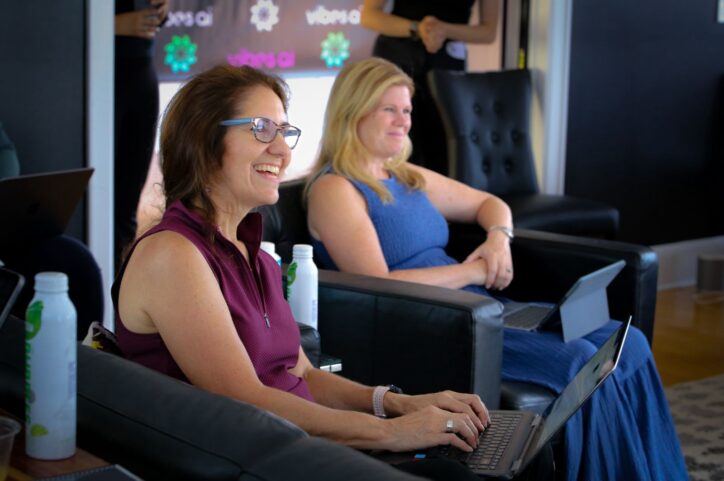
Helen Todd: I got a few comments about Cindy’s podcast [appearance] on my LinkedIn, and went down that whole rabbit hole. I can only imagine what you and your team have to deal with on the regular. As great as the Internet can be, it also shows not the best of humanity.
Joanna Peña-Bickley: We live in a pretty sexist society still. The way that you brought a male ally in, I think is a really good example of how you actually don’t need to answer every troll that comes to us. You can let somebody else do it for you.
Helen Todd: Kara, what about A.I. most excites you?
Kara Uchtman: I’d love to just plus one what Joanna said about some of the investor stuff. We are three females who founded Narratize, and it’s been very interesting in dialogues at events or with partners. They’re like, “Well, there’s so much money in the A.I. space.” People just assume that we’ve gotten tons of money. But the threshold for getting fundraising as a female is completely different. When we’re raising, we’re raising a seed round in December, and now we’re raising kind of like a seed plus. The revenue targets that they expect for this stage are just – when you talk to anybody else, people are like, “There’s no way that’s the target.” And you’re like, “These are the numbers.”
For women in this room, if you are connected to people with money, or you have money, or you have connections into VCs, being an advocate for companies that represent the things you want, or that look the way you want them to – I just encourage that. There’s not enough advocacy assuming that startups have enough money, or if they closed a round, have enough money. Even if you’re not doing venture, but bootstrapping – I just encourage that.
Joanna Peña-Bickley: Female syndicates are another example of where women are banding together to help each other raise that money. Very similar to – I think a good example – we were just talking about at breakfast. The same strategy is being utilized in our political campaigns as well. I’m sure all of you heard there was a Latino call for Kamala, there was a Black women’s call for Kamala. Last night, or two nights ago, it was the white women’s call for Kamala. Those are syndicates. It actually comes out of this strategy that comes out of public organizing behind abortion rights that won in the states. By doing these calls, they come into communities. They try to galvanize the community. The white women’s call, the equivalent of a syndicate, raised – how much money was it, Cindy?
Cindy Gallop: $10 million
Joanna Peña-Bickley 24:16: So this is what we need to do – actually utilize these same mechanisms and methodologies in fundraising.
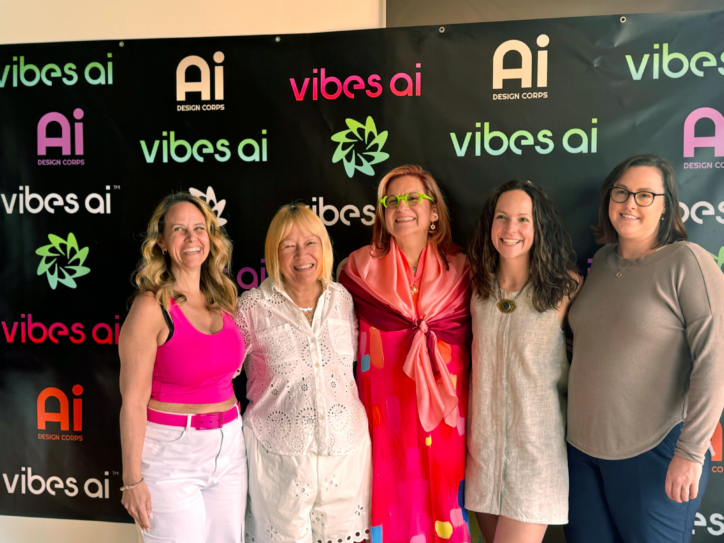
Kara Uchtman I can’t advocate enough for how much your voice, your plus-one, your comment, your endorsement – all those things really matter.
Helen Todd And podcast reviews as well.
Kara Uchtman What I’m most excited about is what you said – the first line on my resume is “passionate problem solver.” I’m not necessarily attracted to AI because I think data science or data engineering is the most exciting thing. What I love is it’s a tool to help us solve problems that are really important, like these big societal impacts. They help upskill all of us and equip us to do more things, or enhance our superpowers by offloading some tasks that take time. So I’m most excited for what AI allows humans to do.
Helen Todd To give context on some of the fundraising stats from the last year or two – out of all VC funding, less than 3% goes to female-founded companies.
Cindy Gallop Only 1.7% last year.
Helen Todd Yeah, such a low percentage. I just saw a headline that in Canada, the first black woman has raised the most in VC funding with $7 million, which is incredible. But if you think about the $150 million that others raise, that’s still just scratching the surface.
Joanna Peña-Bickley The other thing we need to be very cognizant of is the anti-DEI conversation happening right now is also having a chilling effect. There was a fund put together for black women – Fearless Fund. Fearless Fund brought about several wonderful black women-owned businesses. But the backlash to DEI – the court cases that have just been lost in the Supreme Court – they’re now suing those funds into oblivion, effectively making it impossible for women to self-organize in a way that helps our communities.
That’s one of the things from a regulatory standpoint we’ve got to think about when we consider how this moment matters. This moment matters in who we vote for in Congress. This moment matters in who we vote for on local issues and at the top of the ticket. These are the things that we need to consider beyond just our reproductive rights in A.I., we’ll talk a little bit about that. If you want to see more female-founded companies, we’ve actually got to change some things on the Supreme Court, which by the way, is in our hands this November. If we start thinking down-ticket about the women running for office, or the male allies, because if we don’t, what’s at stake is we’ll see what’s happening to black women in the VC world happen to all of us.
“[Women] want to do good in the world. So when we see that these technologies are problematic the first instinct many of us have is, ‘I’m not going to use it.’ I think that’s not the right instinct.
Lori Mazor
Helen Todd We can go down the funding route, but the next question is: What is a topic related to A.I. and women that’s especially important that you want to discuss today, and why? It can be funding-related or not. Lori, would you like to start?
Lori Mazor Related to what you were saying about women not participating in A.I. – I think women are over-indexed in ethics. We want to do good in the world. So when we see that these technologies are problematic – and they are troubled, the way they came into being is troubled, the lack of compensation for creators is troubling – the first instinct many of us have is “I’m not going to use it.” I think that’s not the right instinct.
One of the things Helen and I talked about on her podcast was when I started using A.I. image generation. I got to that moment when I realized that when I typed in “woman,” I always got a white woman. At this time I was reading the book “White Women,” which I highly encourage you to listen to on audio because hearing it read by the author really touches you. I thought, “Oh, this technology is just a mirror on us.”
So technology is what it is. We have so much we can learn about ourselves by using it. The world is a mess – we don’t ever get anything delivered to us perfect. For me, it was a way to figure out how I can work in an imperfect world and be the best version of myself. How can I not cause more harm? I encourage you all to use A.I. and write your own manifesto. Mine was: I’m not going to generate sexualized women. If they are sexy, they’re looking straight at you, they’re going to be big, messy, with dirty hair.
I love Dove’s prompting guide – it goes a long way to helping us generate diverse people and be attuned to visual language. How do you describe someone not just by their race or ethnicity? How do you describe the shape of their face, the way their eyes look? These are all skills we haven’t developed. So that’s my excitement – where can A.I. take us?
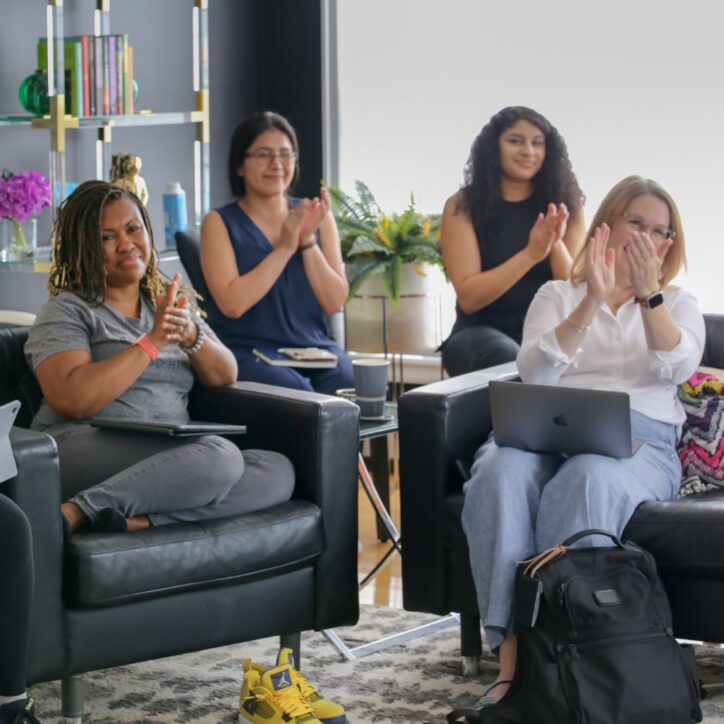
Joanna Peña-Bickley Where can they find the Dove prompting guide? I think this is important as those of us with sons and daughters learn how to better describe women. I had a similar situation where every Latina I would generate was a sexualized version of what men think a Latina looks like. That’s not who we all are. The Dove guide helped me prompt better to describe what I want to see in advertising for a product.
Lori Mazor You can find it on the homepage of the Dove website. Just scroll down to “prompting guide.” One of the guys in my class asked “Are you sure you sent me to the right place? This is a soap company.”
Helen Todd If I’m not mistaken, I think it was either Dove or another brand that recently said they’re not going to use any A.I.-generated images.
Joanna Peña-Bickley This right here – community coming together, sharing what we know, the pitfalls of it. I love what Lori said about product development – there is no perfect product in the world, not even when designed by women. As much as I’d like to believe everything we do is perfect, it isn’t. A.I. is built with our biases. I’m a Latina dyslexic from San Antonio, Texas who grew up with a middle-class lens. That’s my lens, so my A.I. takes that lens. That’s why Alexa does the things she does. It’s not that we don’t have biases – we as humans have biases. But we need more diverse humans involved.
Community is the answer to that. MLK said it best in one of his last speeches before he was assassinated, talking about the choices we have to make – Chaos or Community. It’s one of the most beautiful economic speeches I’ve ever read and it’s defined much of my career. Even in a world of chaos, you’ve got to choose community. Sometimes choosing community is hard and we get frustrated with our own communities, but we’ve got to work and show up – not just online but in physical communities where we haven’t been before.
To me, bringing A.I. to communities that look like me, and communities that don’t look like me, is important. I have a privilege of being a light-skinned Latina, and I get into all kinds of communities because of it. My Latina family – the women who raised me and produced me – are women of color. They look like the young Latinas behind you.
In 1996 my sister and I were driving from San Antonio, Texas. I lived a very sheltered life until that moment.And at this moment, I think and hearken to this place, because by going back to community, I understand what my role in the community is, which is that I have privilege. I actually have white privilege. Now, I’ve never been white passing. Let me be very clear. There’s plenty of people who pass this white somebody asks the first that comes out of my mouth is, I’m a Jewish, Latina. My last name is Peña, and that is pronounced with Enya. Yes, I understand Spanish, so don’t spit shit in front of you. We were trying to use a restroom in Memphis, Tennessee. On that trip, I got to go to the bathroom. She did not. This was 1996 – we came out of the same place. So when bringing A.I. to communities, I go to that moment to say that today our communities of color face an intelligence gap. We have a digital divide and an intelligence gap, and it’s only going to get worse if we stay in our places of comfort. We have to come into community. For me, the most important and exciting thing now is bringing A.I. to our communities.
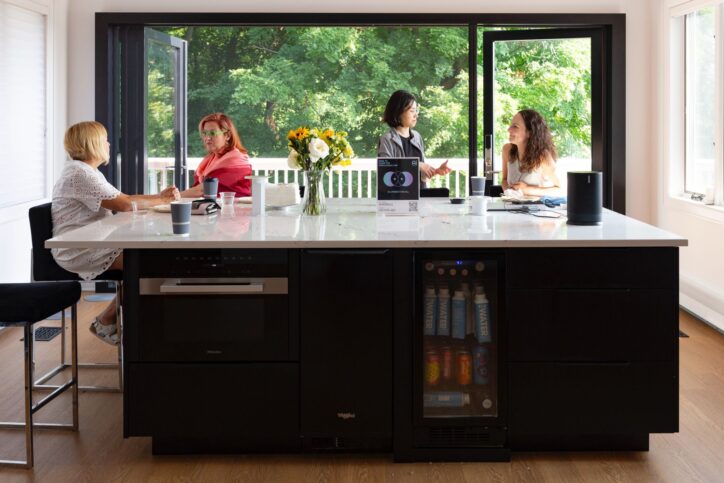
Cindy Gallop The most important thing for me about women in A.I. is what I’m addressing, because I don’t see anybody else doing this. I want to contextualize it in the broader tech landscape. The young white male founders of the giant tech platforms that dominate our lives today are not the primary targets online or offline of harassment, abuse, sexual assault, racism, violence, rape, revenge porn. Therefore they did not and do not proactively design for the prevention of any of those things on their platforms. We see the results of that around us every single day.
Those of us who are most at risk every day – women, Black people, people of color, LGBTQ+, people with disabilities – we design safe spaces and safe experiences, but we don’t get funded. That’s why we’ve still not yet seen what the future of technology can be when it’s designed and built through the female lens at scale.
I designed Make Love Not Porn through the female lens to be the safest place on the internet. We decided on what everyone else should have. Nobody else does human curation – there is no self-publishing of anything on Make Love Not Porn. Our curators watch every video submitted from end to end before we approve or reject it. They review every post on every member profile, every comment on every video before we approve or reject and publish it. No one else does that. We can vouch for every single piece of content on our platform in a way that no one else can.
Here’s the important point about that – we’re tiny, bootstrapping, we have no money, and we’ve human curated everything for 11 years. Imagine what Facebook, Instagram, TikTok, Snapchat could do with their billions if they chose to. Safety on the internet is not a matter of viability, it’s a matter of will.
So what this means is that in the same way OpenAI’s ChatGPT is built on large language models, I have something very unique – I have an LVM, a large video model, that is the world’s only pool of 100% human-curated, fully consensual, real-world sex content. I want to use A.I. to turn that LVM into an algorithm for consent with many use cases. This is actually an A.I. enterprise application.
I’ll give you a couple of examples:
Hollywood – All around us in popular culture right now are many depictions of sex and sex scenes that purport to be consensual but are actually modeling non-consensual behavior, whether it’s Game of Thrones where rape is prevalent, or rom-coms where even within a love story, the sex scenes have zero foreplay, instant penetration, instant simultaneous orgasm, zero communication. Imagine being able to run your script or film through an algorithm that will tell you whether what you are modeling is or isn’t consensual.
Another obvious use case is criminal court. As we know, something like 1% of all rape cases ever make it into the judicial system, and an even tinier percentage ever result in convictions. Rape is the only crime where the onus is entirely on the victim to prove it happened. Imagine being able to bypass the “he said, she said” of the courtroom and the entrenched biases of judges with an algorithm that can analyze the nuances of whether what occurred was consensual.
Those are just two examples, but that is the future of A.I. through the female lens. It’s not getting funded. I’m actively looking for funding for this – Joanna has been very helpful with some suggestions. This is incredibly important to me because it’s the opposite of the deepfake porn explosion we just discussed, and it’s part of our ultimate mission at Make Love Not Porn to help end rape culture globally. Nobody else is using A.I. to do anything like this currently.
Helen Todd One thing I’ll add to what Cindy said – on the podcast we talked about this and I asked about trauma for the human moderators, like we see with social media content moderation. Cindy, can you share what you said about that?

Cindy Gallop It’s funny because people ask “Oh my god Cindy, what mental health measures do you have in place for your curators? They must have to watch such terrible things.” And I say no, because again, this is things through the female lens. For us, human curation starts far earlier than on the platform itself. I designed Make Love Not Porn around good sexual values and behavior – my own values. We make it crystal clear what Make Love Not Porn stands for and what kind of content we want, not just in our FAQs but across all our social channels and media interviews.
Here’s the funny thing the young white bros never thought of – when you make it crystal clear what you stand for and what kind of content you want, that is the only kind of content you get. Our curators watch nothing but love all day long. We get amazing content because we made it really clear what we stand for.
If you don’t stand for anything, you’ll fall for everything, as the saying goes. You can’t just launch a social media platform and say “Everybody come on in!” and not expect a complete disaster to ensue. That’s what those unfortunate content moderation farms in the Philippines are having to deal with. We don’t deal with any of that.
One of my philosophies is “Be your own filter.” Anybody following me on LinkedIn will know my bio says “I like to blow shit up. I’m the Michael Bay of business.” I use that line deliberately, because when I characterize what I do in that way, it attracts the people who want what I do and repels the ones who don’t. And I want to repel the ones who don’t – they’re a waste of time and money. So yeah, be your own filter.
“It’s not just about race. It’s about thought, ability, the places we come from. It can’t be just a coastal company – it has to be a company that incorporates rural, urban and suburban perspectives. Health is human, cognition is human, so we are going to be a human company. Infinite diversity in infinite combinations is the standard by which we operate.”
Joanna Peña Bickley
Helen Todd I love that your moderators get to watch love all day. Okay, I’ll ask the next question, because Cindy gave us a good segue. Each of you incorporates inclusiveness in your work in different ways. Lori, one thing I want to highlight that you said on the podcast – I thought it was interesting when Google over-indexed and anytime you searched for “US president” it showed mostly Black or brown results. I thought it was funny because all the white people got their feathers ruffled, but you actually thought that was a good thing. Can you speak to that? The question is how you incorporate inclusiveness as you build guardrails into your products. Lori, I’ll let you start, then Kara, then Joanna, and Cindy.
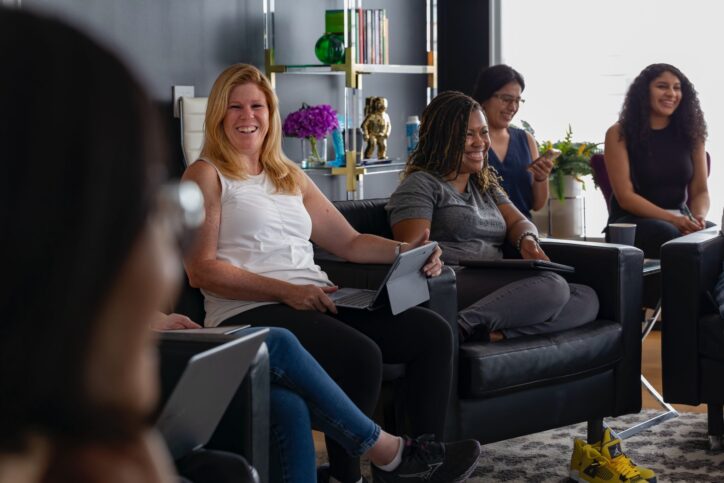
Lori Mazor I try to be inclusive and demonstrate it. If there are words that follow, that’s great, but most of the time it’s about actions. When I make images or video, there are points in the process where you have a choice. I talk about A.I. as a chaos machine – we’re working with vast amounts of data, and intentionally it’s supposed to be a creative engine. If you read the earliest computer science literature, it’s about “How can we make a machine that can be creative?” So don’t take that as a human threat.
What I like about it is it’s a dialog, and the points I can control are: I can control my language. I can control where source images come from if I’m uploading reference images. I can control what comes back to me and what I curate. Curation is probably the first skill that leads any artist into their profession. Technical skills come later – the ability to see and recognize what’s meaningful to people comes first. We’ve talked a lot about creativity not being about novelty. It’s easy to be novel and weird – some people will connect with that. But how can you do things that are meaningful to other human beings? Humans do that through the curation process.
The last thing – what you put out into the world, whether it’s art or a product, that is your message. So I make sure that what I create represents me, whether it came from my hand or a computer. I own the responsibility of what I put out there. If people criticize me, I can change my mind and fix it. It doesn’t have to be perfect. I invite conversation.
Helen Todd You were really okay with Google over-indexing on the DEI effort in search results. Can you share why?
Lori Mazor Because number one, let’s look at what DEI is. DEI is over-indexing, because we have to, because life isn’t fair. If two people stand to pick an apple, a shorter person isn’t going to be able to reach – they need a stool. Many of us need stools. In golf there’s a handicap system. So I figured you have to swing one way in order to get back to the middle. I commend Google for swinging that way – somebody needed to figure out how to override the existing bias.
Helen Todd If you’re not aware, the chatbots and language models have some guardrails built in, but generally not enough. That’s something that Narratize does with your tool, Kara. Can you speak to that?
Kara Uchtman When I think of inclusivity, I think about it in two ways. One is what we’re building in terms of the product we’re launching, and the other is the company we’re building.
For the product, we have responsible A.I. principles at Narratize. Those cover everything from privacy and security to bias mitigation. Every time we’re building a feature or part of our product, we’re looking at those principles. They’re part of our checklist for how we bring things to life, making sure we’re using the right data, using people’s data safely, and that the product we’re producing has DEI layers built in to ensure the results aren’t biased or perpetuating stereotypes like “woman = white woman.” We’ve actually tried to break some of our systems to make them super biased, in case someone chose to do that with our product, to ensure it wouldn’t work. So that’s an extra step in our development process.
On the company side, inclusivity is in our values and how we operate. It’s not just about how we look, it’s about how people think, the experiences they’ve had, the backgrounds they bring. In our policies as we build the company, we’re accommodating a variety of needs. So I think about inclusivity and try to establish standards for both the product and the company.
Helen Todd Joanna, your thoughts on incorporating inclusiveness?
Joanna Peña-Bickley Infinite diversity in infinite combinations. We talked a little bit about this yesterday. It’s at the core of who Vibes AI is. We demand that 95% of the global population is represented in our dataset, with a plus or minus 5% deviation. That’s core – the representation of 95% of the global population’s data.
I will tell you that it’s a hard thing to do. It shouldn’t be, but it is. But if you have that tenet, then you’re always working towards it. We’re always challenging ourselves to meet that standard. We set the bar that high because, by the way, in standard deviations, that’s as big as you can get. There’s no way at this time to get 100% with plus or minus 5% – that’s just not how math works.
But with that said, representation in our data models is key. Our company, Vibes AI, is 100% minority-owned – not just by myself, by Toy, by the people not represented here today like Puneet Ahira, who is also a co-founder and our Chief Science Officer, Rafael Hernandez who is our COO, and Alvaro. There’s a thread here – we might all be Latinos except for Toy, but we represent infinite diversity. Italian, Nicaraguan – infinite diversity in infinite combinations.
It’s not just about race. It’s about thought, ability, the places we come from. This can’t be just a coastal company – it has to be a company that incorporates rural, urban and suburban perspectives. Health is human, cognition is human, so we are going to be a human company. Infinite diversity in infinite combinations is the standard by which we operate.
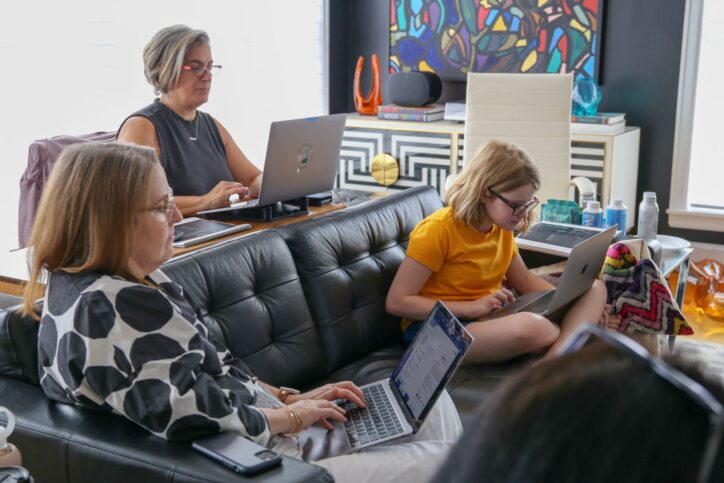
Helen Todd We’re getting short on time and I want to squeeze in one or two more questions. Cindy, if you could give a short version of your response?
Cindy Gallop Make Love Not Porn exists to celebrate the full glorious spectrum of human sexuality. So I decided to be fully diverse and inclusive from the start. Our members and contributors are male, female, trans, non-binary. We’re global. They represent all races, ethnicities, orientations – straight, LGBTQ+, asexual, all ages from 18 to 80.
I completely concur with Kara that it’s very important to build something diverse and inclusive – your team has to be diverse and inclusive. I have a tiny team of seven, but within that team we are white, Black, Latina, half-Chinese, Asian, straight, queer, etc.
The final thing I’ll say is that as far as I’m concerned, DEI stands for Driving Excessive Income.
Helen Todd Okay, we’re going to do one last question. Instead of “What advice would you give your younger self?”, my question is: What question do you have for your future self right now? Only answer one question, because I want you all to have time to plug your work too. Who wants to jump in?
Cindy Gallop My question for my future self is: Cindy, are you a billionaire yet?
Joanna Peña-Bickley Will you be a trillionaire?
Lori Mazor How was it?
Kara Uchtman What else are you capable of?
Helen Todd Okay, so we have four minutes left. What would you like to share, promote or plug? There are books, things to sign up for. Kara, what would you like to plug?
Kara Uchtman Go to narratize.com, try it for free, subscribe, and give me your feedback. Candid feedback is such a gift.
Joanna Peña-Bickley You can buy my book on Amazon.com. Visit me on LinkedIn and follow my content. Contribute in whatever way you want. Please subscribe to my newsletter. This is the beginning of cognitive health for every woman in this room.
Cindy Gallop Please go to wefunder.com/makelovenotporn and invest in what I’m doing. The minimum investment is $100. Please invest, spread the word, and tell all your friends to as well if you like what I’ve talked about today.
Helen Todd And if you’ve enjoyed this panel, each of these women has been on my podcast. You can listen and do a deeper dive into the conversations too. Just Google their names and “Creativity Squared” or go to my website and you can find more content with each of them. So with that, let’s give them all a round of applause!
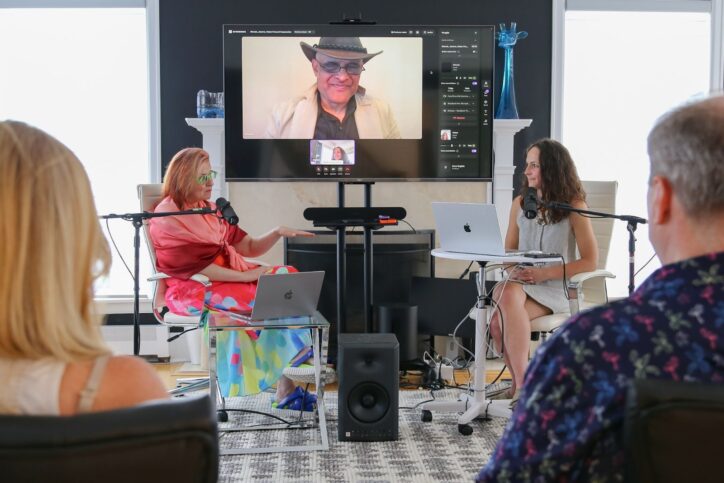
Coming Up: Dinesh Maheshwari’s Live Interview on C2
Make sure you’re subscribed to Creativity Squared so you don’t miss out on a really exciting interview coming out in September with the Chief Technology Officer at Groq, Dinesh Maheshwari. Dinesh is also a professional advisor for startup companies, having co-founded three himself and been granted almost 60 patents so far.
After seeing him on stage at MIT Media Lab’s AI Summit and Cincy AI Week, we invited him to discuss his human-centric A.I. perspective.
